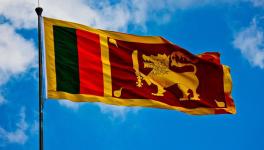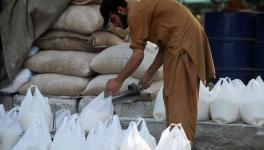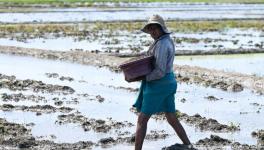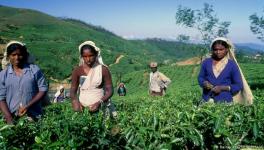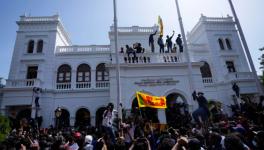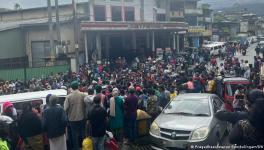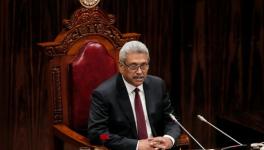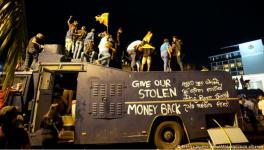Sri Lankan Political Turmoil: Newsclick Commentary
In February 2010 General Fonseka, the opposition presedential candidate was arrested after the incumbant Rajapaksa won a clear victory. Gen. Fonseka commenting in the press that the elections were fraudulent and his subsequent arrest has cast a shadow on the political process in Sri Lanka. Srinivasan Ramani comments for Newsclick
Transcript
Sri Lankan President Mahinda Rajapaksa won an emphatic victory in the presidential elections held just a few days back. He defeated ex-General Sarath Fonseka by a large margin - nearly 17% points . The president's gamble of scheduling early elections to cash in on his popularity following the defeat of the Liberation Tigers of Tamil Eelam therefore indeed paid him dividends. The chief opposition candidate, former army chief Sarath Fonseka, however refused to accept the verdict, calling the elections rigged post the declaration of results. The general also made a slew of allegations about possible assassination and him wanting to leave the country temporarily for his safety (Al Jazeera Video Clipping). It was clear that the clear election outcome had only increased the distance between these two leaders who were lynchpins in the civil war against the LTTE.
Merely a fortnight since the results, general Fonseka has been arrested by the government on charges of conspiring to a military coup and harbouring deserters.
At the time of his arrest, Fonseka was meeting with his supporters - leaders from various opposition parties - trying to chalk a strategy for upcoming parliamentary elections . And just a few hours before his arrest, Fonseka made a couple of strong statements in a media briefing that he "is prepared to give evidence in an international court on war crime charges against Sri Lanka."
General Sarath Fonseka speaking to journalists in Colombo on Monday also said, "I am not going to save anyone who has committed war crimes".
"I am definitely going to reveal what I know, what I was told and what I heard. Any one who has committed war crimes should definitely be brought into courts". [Separate and Zoom]
It must be remembered that the United Nations had only a few days ago confirmed that videos showing Sri Lankan army atrocities on Tamil citizens were genuine. (Footage on War Crimes against Tamils) Fonseka, who was the army chief during the operations against the LTTE, had also taken support from Tamil parties for his candidacy and a similar alliance was being mooted for the parliamentary elections scheduled in April. Fonseka was supported by an united but disparate set of political actors - from the liberal and pro-market United National Party, to the ultranationalist and officially communist Janatha Vimukti Peramuna to even the Tamil National Alliance, which was a pro-LTTE separatist outfit during the days of the civil war. No wonder Fonseka won the most number of votes in areas with greater presence of Tamils and other minorities.
It is quite apparent that the Rajapaksa regime, contrary to the president's assurance post the elections, is not so keen on reconciliation and working with the opposition parties, most of whom favoured Fonseka's candidacy. The Sri Lankan state has still not resolved the "national question" with devolution of political power to Tamil and Muslim majority areas still found to be wanting and expectations of a lasting and meaningful solution are quite low.
Even though the LTTE, which represented a fascist leadership to the Tamil separatist claim was defeated, there is still a lot of disenchantment among the Tamils and other minorities in the country. The Rajapaksa presidency promised a "homegrown" political resolution and devolution of powers, but with the government more keen on browbeating the opposition, it remains to be seen as to how the "solution" plays itself out. Ethnic nationalism and deep division among the Sinhalese, the Tamils and the Muslims has characterised the Sri Lankan society and the immaturity of its polity has not helped matters.
Sri Lanka now also faces newer challenges besides the lingering ones- the heavy involvement of the military in politics, the continuing chauvinist and jingoist tendencies among most of the political parties, and the illiberal and authoritarian nature of the government which has not tolerated dissent or varying opinion against it. No doubt, there has to be a change in direction - the government should be more tolerant of criticism, it has to reach out to the traumatised Tamil population still recovering from war in the north and must keep the military out of politics, apart from working consensually with the opposition to bring back a semblance of democratic and civil politics. On the contrary, the arrest of general Fonseka reeks of witch-hunting and trying to browbeat the opposition, steps that will only exacerbate the political situation in the country.
Get the latest reports & analysis with people's perspective on Protests, movements & deep analytical videos, discussions of the current affairs in your Telegram app. Subscribe to NewsClick's Telegram channel & get Real-Time updates on stories, as they get published on our website.











